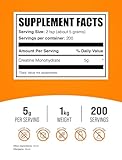If you’re wondering “what should I mix creatine with for best results,” you’re asking the right question. Creatine monohydrate is one of the most extensively researched and effective supplements for improving athletic performance, muscle strength, and power output.
While creatine itself is highly beneficial, what you mix it with can dramatically impact its absorption, effectiveness, and your overall results. Here’s a comprehensive guide to optimizing your creatine supplementation with the right mixing strategies.
Table of Contents
The Science Behind Creatine Absorption
Creatine uptake by muscle cells is enhanced by insulin, which acts as a transport mechanism. This is why combining creatine with certain substances that stimulate insulin release can improve its effectiveness. The goal is to maximize the amount of creatine that actually reaches your muscle tissue rather than being excreted unused.
Best Mixing Options for Creatine
Simple Carbohydrates
Mixing creatine with fast-digesting carbohydrates is one of the most effective approaches. The carbohydrates cause an insulin spike, which helps shuttle creatine into muscle cells more efficiently.
Ideal options include:
- Dextrose (grape sugar)
- White grape juice
- Apple juice
- Sports drinks with simple sugars
The recommended ratio is approximately 70-100 grams of simple carbohydrates per 5 grams of creatine. While this may seem like a lot of sugar, research shows it significantly improves creatine uptake.
Protein and Carbohydrate Combinations
Combining creatine with both protein and carbohydrates can be particularly effective, especially post-workout. This combination provides the insulin response needed for creatine uptake while also supporting muscle protein synthesis.
Effective combinations:
- Whey protein shake with banana
- Chocolate milk with added creatine
- Post-workout recovery drinks containing both macronutrients
Warm Water or Tea
For basic mixing purposes, warm water is often the best choice for dissolving creatine powder completely. Creatine dissolves more readily in warm liquids, reducing the gritty texture that some people find unpleasant.
Green tea can be an excellent option as it provides some caffeine (which may have synergistic effects with creatine) while helping with dissolution.
Alpha-Lipoic Acid
Some studies suggest that alpha-lipoic acid (ALA) can enhance creatine uptake even more effectively than carbohydrates alone. ALA improves insulin sensitivity and glucose uptake, creating an optimal environment for creatine absorption.
What to Avoid Mixing with Creatine
Caffeine
While the research is mixed, some studies suggest that caffeine may interfere with creatine’s benefits, particularly for high-intensity, short-duration activities. The mechanisms aren’t fully understood, but caffeine may counteract some of creatine’s effects on muscle contraction.
If you consume caffeine regularly, you don’t necessarily need to eliminate it entirely, but avoid taking creatine and caffeine simultaneously. Learn more about safe caffeine limits for adults over 50.
Acidic Beverages
Highly acidic drinks like orange juice, lemon juice, or other citrus beverages may degrade creatine over time, converting it to creatinine (an inactive form). While short-term mixing is generally fine, avoid letting creatine sit in acidic solutions for extended periods.
Timing Considerations
Post-Workout Window
The post-workout period is often considered optimal for creatine consumption. During this time, your muscles are primed for nutrient uptake, and combining creatine with your post-workout meal or shake can maximize absorption.
With Meals
Taking creatine with meals, particularly those containing carbohydrates, can help improve uptake while reducing the likelihood of stomach upset that some people experience with creatine on an empty stomach. Check out these power breakfast recipes that could work well with creatine supplementation.
Be sure to check out my recent article on the best creatine for females over 50!
Practical Mixing Tips
Dissolution Techniques
- Use warm (not hot) water to help creatine dissolve completely
- Stir thoroughly or use a shaker bottle
- Let the mixture sit for a few minutes if needed
- Consider micronized creatine, which dissolves more easily
Dosing Strategy
During the loading phase (if you choose to do one), mix your daily dose into 3-4 smaller servings throughout the day rather than taking it all at once. This can improve absorption and reduce digestive discomfort.
For maintenance dosing (3-5 grams daily), timing becomes less critical, but consistency is key.
Sample Mixing Recipes
Basic Effective Mix
- 5g creatine monohydrate
- 1 cup warm water
- 2 tablespoons honey or dextrose
Post-Workout Power Mix
- 5g creatine monohydrate
- 1 scoop whey protein
- 1 large banana
- 1 cup milk or water
- Optional: 1 tablespoon honey
Simple Juice Mix
- 5g creatine monohydrate
- 8 oz white grape juice
- Mix and consume immediately
The Bottom Line
The most important factor in creatine supplementation is consistency rather than perfect timing or mixing. While combining creatine with simple carbohydrates can enhance uptake, even taking creatine with plain water will provide benefits if you’re consistent with your supplementation.
Choose a mixing method that you’ll actually stick with long-term. If elaborate carbohydrate combinations seem too complicated or add unwanted calories to your diet, simply mixing creatine with water and taking it consistently will still provide significant benefits.
Remember that creatine works through saturation of your muscle stores over time, so consistent daily intake matters more than any single perfect dose. Focus on finding a mixing method that tastes good to you, dissolves well, and fits into your daily routine for the best long-term results.
Be sure to check out my recent article on the best creatine for older guys and ladies!
Frequently Asked Questions
Does it matter if creatine is not fully dissolved?
Yes, it does matter to some extent. Undissolved creatine particles can cause digestive discomfort, including stomach upset and diarrhea.
Poorly dissolved creatine may not be absorbed as efficiently by your body. To ensure complete dissolution, use warm water, stir thoroughly, and consider micronized creatine powder, which dissolves more easily than regular creatine monohydrate.
If you notice gritty particles at the bottom of your glass, add more liquid and stir again.
Can I mix creatine with my protein shake?
Absolutely! Mixing creatine with your protein shake is one of the most convenient and effective methods.
Protein shakes often contain carbohydrates (especially if you add fruit or use flavored protein powders), which can help enhance creatine uptake.
This combination is particularly beneficial post-workout when your muscles are primed for nutrient absorption. Just add your usual 3-5 grams of creatine to your protein shake and blend or shake thoroughly. For more guidance, check out our guide on the best protein powder for women over 50.
Can I add creatine to food?
Yes, you can add creatine to various foods, making it an easy way to incorporate it into your daily routine.
Creatine is tasteless and odorless, so it won’t affect the flavor of your food. Good options include mixing it into oatmeal, yogurt, applesauce, smoothie bowls, or pudding.
Just ensure the food isn’t extremely hot, as high temperatures can degrade creatine. Room temperature or slightly warm foods work best.
How long can I leave creatine mixed in liquid before it loses effectiveness?
Creatine is most stable when consumed immediately after mixing. In neutral pH liquids like water, creatine remains stable for several hours at room temperature.
However, in acidic beverages or when exposed to heat, creatine begins converting to creatinine (an inactive form) more quickly.
For best results, consume your creatine mixture within 1-2 hours of mixing, and avoid leaving it in acidic liquids for extended periods.
Is it safe to take creatine with pre-workout supplements?
Generally, yes, but read labels carefully. Many pre-workout supplements already contain creatine, so you could be double-dosing if you add more.
Additionally, most pre-workouts contain caffeine, which may interfere with creatine’s benefits according to some research.
If your pre-workout doesn’t contain creatine, you can safely add 3-5 grams, but consider taking them at different times of day to avoid any potential caffeine interference. Learn more about post-workout supplement safety.
Can I mix different types of creatine together?
While you can technically mix different forms of creatine (like creatine monohydrate with creatine HCl), there’s no significant benefit to doing so.
Creatine monohydrate remains the gold standard with the most research backing its effectiveness. Other forms of creatine are often more expensive without providing additional benefits.
Stick with creatine monohydrate unless you have specific digestive issues that warrant trying alternative forms.
Check out our comparison of creatine capsules vs powder for more insights.
What should I do if creatine upsets my stomach?
If creatine causes digestive discomfort, try these strategies: take smaller doses throughout the day instead of one large dose, ensure it’s completely dissolved before consuming, take it with food rather than on an empty stomach, or switch to micronized creatine which is easier to digest.
Some people also find that skipping the loading phase and starting with the maintenance dose (3-5 grams daily) reduces stomach upset.
Can I mix creatine with hot beverages like coffee or tea?
It’s best to avoid mixing creatine with very hot beverages. High temperatures can degrade creatine and convert it to creatinine, reducing its effectiveness. If you want to add creatine to warm beverages, let them cool to lukewarm temperature first.
Additionally, since coffee contains caffeine, which may interfere with creatine’s benefits, consider taking your creatine at a different time than your coffee consumption.
Should seniors approach creatine mixing differently?
For adults over 50, the same mixing principles apply, but there are some additional considerations. Creatine for seniors can be particularly beneficial for maintaining muscle mass and bone health.
Seniors may want to start with smaller doses to assess tolerance and should ensure adequate hydration when supplementing with creatine. The benefits of creatine for age-related muscle loss and brain health make proper supplementation especially important for this age group.
Can I take creatine if I’m trying to lose weight?
Yes, you can and should consider taking creatine while trying to lose weight. Creatine helps preserve muscle mass during weight loss and can improve workout performance, leading to better results.
Learn more about taking creatine while trying to lose weight and how it fits into your fitness goals.
Is creatine effective even without working out?
While creatine is most beneficial when combined with exercise, it can still provide some benefits even without regular workouts. These include potential cognitive benefits and basic muscle preservation.
However, to maximize creatine’s effects on strength and muscle building, regular resistance training is recommended. Read more about taking creatine without working out to understand the complete picture.
Can I add creatine to my preworkout?
You can add creatine to your preworkout supplement, but there are important considerations. First, check if your preworkout already contains creatine to avoid double-dosing.
Most preworkouts contain 3-5 grams of creatine, which is a full serving. Second, be aware that most preworkouts are high in caffeine, and some research suggests caffeine may interfere with creatine’s effectiveness.
If your preworkout is caffeine-free or low in caffeine, adding 3-5 grams of creatine can be beneficial. For optimal results, consider taking creatine separately from your caffeinated preworkout—perhaps taking creatine post-workout and your preworkout before training.

Rick Huey is a fitness writer who has dedicated his life to living an active lifestyle. With more than 30 years of experience in the fitness industry, Rick is a respected contributor for FitFab50.com, where he shares his wealth of knowledge with a wide audience. His dedication to promoting the benefits of living an active lifestyle has inspired many people to pursue their own fitness journeys with enthusiasm and dedication.
Last update on 2026-02-22 / Affiliate links / Images from Amazon Product Advertising API



